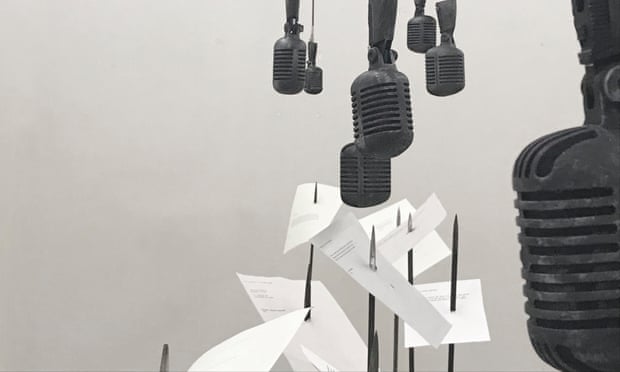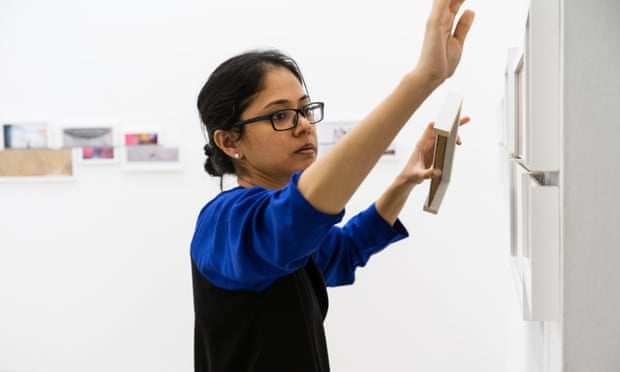- UID
- 20
- Online time
- Hours
- Posts
- Reg time
- 24-8-2017
- Last login
- 1-1-1970
|
For centuries, poets have been jailed or killed for speaking out against injustice – but they speak again an eerie sound installation at Edinburgh art festival.

Tongues untied: Shilpa Gupta’s installation For, in Your Tongue I Cannot Hide, 2018 Photograph: Courtesy of the artist.
▼ In a disused fire station in Tollcross, Edinburgh, Shilpa Gupta stands, head cocked, beneath a row of speakers strung from the ceiling. There is a crackle, and a burst of noise reverberates through the space: a man’s voice, intoning the words “without revolution, there can be no proper peace”. As the voice dies away, a gentle susurration begins, like the distant clattering of bird’s wings. It resolves into a chorus of whispering voices. They seem to be coming from everywhere.
Suddenly, there is a loud mechanical squeal: across the room, a technician is attaching something to the wall with an electric screwdriver. Gupta wrinkles her nose. “Yes, that one is not planned.”
You don’t have to go far at this year’s Edinburgh art festival to encounter the sorrows of the modern world. In a former kirk just off the Royal Mile, the Scottish artists Ross Birrell and David Harding are exhibiting a film that repurposes Henryk Gorécki’s orchestral lament for the Holocaust, sung by refugees. Stroll into the National Gallery on the Mound and there, among the Titians and Tintorettos, you come face to face with a monumental Jenny Saville painting depicting the limp body of a Syrian child.
But in Gupta’s work those sorrows resonate both loudly and literally. Entitled For, In Your Tongue I Cannot Hide, the piece corrals the voices of 100 poets who have been imprisoned, and in many cases executed. The oldest hails from the eighth century; the youngest is the Burmese writer Maung Saungkha, who was arrested by the authorities in 2016 aged 22, for writing a poem in which he claimed to have a tattoo of Myanmar’s president on his penis(he didn’t, but served six months). Their words have been transformed into a piece of immersive sound art.

‘It has stretched my brain a little’ … Shilpa Gupta at work. Photograph: Ela Bialkowska
Even with the installation far from finished – “I think we’re about 12% complete,” Gupta says when we sit down in the canteen next door – it is an overwhelming experience, both piercing and claustrophobic. Many of the voices speak English, but alongside them are a babel of other tongues – Chinese, Russian, Arabic, Azeri, Hindi, Turkish, Urdu. Pinioned beneath each speaker is a print-out of their poem, skewered by a metal spike. Being among them, lights low, is a little like standing in a dungeon. The voices press and jostle. We will not be silenced, they seem to say.
Like much of Gupta’s art, this new project was born out of an earlier one; a 2011 work called Someone Else, which brought together books by authors who’d written under pseudonyms. Another was the darkening climate in her native India since the election of the right-wing populist Narendra Modi as prime minister in 2014 – an event that now looks like a grim foreshadowing of events elsewhere. (▪ ▪ ▪)
► Please, read the full note here: Source |
|